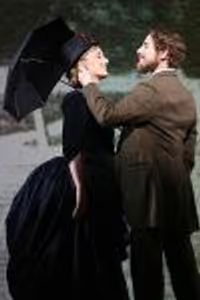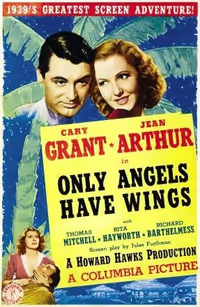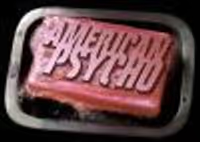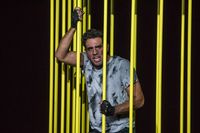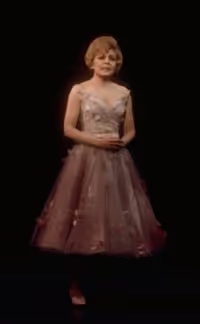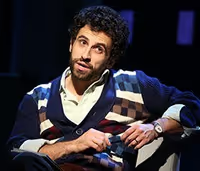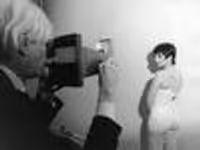The Low Road at The Public
LightsOut90
Broadway Legend Joined: 5/2/14
#1The Low Road at The Public
Posted: 2/25/18 at 1:47am
Whoa, anyone else see this yet? Ill have more thoughts in the morning, but this is easily Bruce's best play since Clybourne Park, and the scale of it is INSANE, highly recommend it, hilarious, bleak and a scream into the universe
FutureDirector
Stand-by Joined: 11/8/13
#2The Low Road at The Public
Posted: 2/25/18 at 2:09am
Completely Agree! I found act 1 more engaging than Act 2 (it's just more tightly structured), but Act 2 had me by the end. Michael Grief's work on this and the production design is somewhat mind blowing especially when you consider what they're up against in that space. And the actor that plays John Blanke (not sure how it's spelled) is giving a breakout performance.
I was already excited as a big Bruce Norris fan but this blew my expectations. The scene that involves the two main gentleman and the mugger in act 1, which I won't say much about to avoid any spoilers, is worth the price of admission alone.
AntV
Broadway Star Joined: 12/23/12
#4The Low Road at The Public
Posted: 2/25/18 at 11:47pm
AntV said: "How much nudity is in this?"
A man is naked for a large portion of a scene, but he covers the important bits the whole time.
#5The Low Road at The Public
Posted: 2/26/18 at 1:15am
JBroadway said: "AntV said: "How much nudity is in this?"
A man is naked for a large portion of a scene, but he covers the important bits the whole time."
Incorrect. I was far house left and definitely got at least 30 seconds of full frontal.
LightsOut90
Broadway Legend Joined: 5/2/14
#6The Low Road at The Public
Posted: 2/26/18 at 1:21am
Fantod said: "JBroadway said: "AntV said: "How much nudity is in this?"
A man is naked for a large portion of a scene, but he covers the important bits the whole time."
Incorrect. I was far house left and definitely got at least 30 seconds of full frontal."
well arent you lucky.
#7The Low Road at The Public
Posted: 2/26/18 at 1:59am
Fantod said: "JBroadway said: "AntV said: "How much nudity is in this?"
A man is naked for a large portion of a scene, but he covers the important bits the whole time."
Incorrect. I was far house left and definitely got at least 30 seconds of full frontal."
They're really putting the P in the PV seats.
#8The Low Road at The Public
Posted: 2/26/18 at 10:57am
Fantod said: "JBroadway said: "AntV said: "How much nudity is in this?"
A man is naked for a large portion of a scene, but he covers the important bits the whole time."
Incorrect. I was far house left and definitely got at least 30 seconds of full frontal."
Ah, well I guess I stand corrected, unless you went to a different performance and he just does different things at different performances. The only time he uncovered himself was when he was standing and facing further upstage - I assumed he had moved to a position where nobody could see anything, but I guess some could. I was in the center section, and from my view he had it covered the whole time.
#10The Low Road at The Public
Posted: 2/26/18 at 2:53pm
bekk99 said: "Who is the actor we are discussing?"
Chris Perfetti, the lead.
I guess I should chime in on the show in a more meaningful way, though I'm still working out my thoughts. It's a wild, epic piece. Often entertaining, sometimes thought-provoking, and frequently over-the-top. It's very satirical, and most of the play is infused with a kind of self-aware wit, which sometimes works but sometimes doesn't. It's essentially an exploration of modern greed through the lens of the Revolutionary era. It kind of feels like Django Unchained meets The Wolf of Wall Street - which is a gross overgeneralization of the piece, but it's something that came to my mind. The cast feels enormous, and packed with familiar faces, which was fun to see. Grief does a great job with it.
It's messy, sprawling, ambitious, and potentially problematic, but it's also very interesting and entertaining. I expect some will love it and some will hate it. For my part, I'm very glad I saw it, and it was well worth the $27.50 for the TodayTix rush (which was very easy to get yesterday).
FutureDirector said: "the actor that plays John Blanke (not sure how it's spelled) is giving a breakout performance."
I agree he's wonderful, but Chuk Iwuji is no up-and-comer! He's been around for a while, and has quite the resume under his belt between his work in New York and London.
FutureDirector
Stand-by Joined: 11/8/13
#11The Low Road at The Public
Posted: 2/26/18 at 4:17pmI recognized him from his RSC work, but this is the first time I've seen him live in New York. So I guess I thought this was his first major New York role.
#12The Low Road at The Public
Posted: 2/26/18 at 4:23pm
This is an outstanding production. It has something of a riotous character, but with a purpose. The writing is generally very sharp, the acting uniformly excellent, and the staging well executed for that space. It has its flaws - in particular, for me, the overly simplistic dialogue about free markets and globalization. But it is, I think, one of the better shows happening in NY right now. (I guess I should note that I saw some people leave at intermission, so it's clearly not for everyone. Another side note: I was sitting next to John Douglas Thompson, who seemed to be enjoying the play immensely).
Updated On: 2/26/18 at 04:23 PM#13The Low Road at The Public
Posted: 2/26/18 at 4:47pm
You have all piqued my interest. Hopefully I'll win the rush sometime next week.
#14The Low Road at The Public
Posted: 3/14/18 at 6:20pm
I have to say, this is definitely not the best show, but it's a damn good time and one of the most well put together plays I've seen at The Public considering its size and subject matter. It has potential to be boring, but it isn't because it has been executed with polish and precision -- it's the kind of play that a high school would probably do because of its cast size and satire, but not pull off well at all.
Thematically, it's the anti-Candide (pardon stealing this phrase from the program, but it really is a perfect comparison), where instead of being charmed by our naive protagonist, you are rolling your eyes at him. Does it tie up nicely in the end? Not really. Are some of the more modern elements (Act 2 opening? Space bees?) required? Not really, but I didn't mind them. Does it actually end up saying something about greed? Yes, but then blatantly contradicts its self as well. Does it blugeon you over the head with its themes? Yeah, and even though I sat there thinking "Come on, we're all adults here", I wanted more. Act 2 didn't have quite the fun of Act 1, but it was really a great time.
Rush tickets are pretty easy to get on TodayTix if you set an alert. For $27.50, it's worth every penny.
#15The Low Road at The Public
Posted: 3/14/18 at 7:09pm
All I ask of a show is to give me one good thing - even if the text is a mess, the direction garbled, the actors scrambling, all I need in the theatre to make me feel like I haven't wasted my time if one fantastic moment.
I walked out of the first act hating the play as a whole and admiring the performances by the more than capable actors. I really didn't want to return, but I dutifully sat back in my seat and was rewarded with the most phenomenal fifteen minutes of theatre - and one of the most brilliant openings to a second act I've ever seen. If the rest of the show (a snooze fest without a single character to care about and long rants and raves including the words "invisible hand" to a nauseating extent) screams of pretention and the feeling the writer read a Brecht 101 book before writing the piece, this opening does exactly what the author wants it to in a way the rest of the play never does. It crackles, drives a point home, and is entertaining. The rest of the show suffers from messy writing and uninteresting characters (I was going to say unlikable, but who cares about unlikeable people when they're interesting?). The end is ridiculous to the extreme. But those fifteen minutes were a damn good time.
AntV
Broadway Star Joined: 12/23/12
#16The Low Road at The Public
Posted: 3/14/18 at 9:34pmCare to spoil that act 2 opener for us? Still not convinced to see this, the poster above didn't seem to like that opener.
#17The Low Road at The Public
Posted: 3/14/18 at 10:05pm
Frankly, I don't think anyone needs to see this and am getting tired of Brantley's efusive praise to white men writing (mediocre) plays about race and power when dozens, if not hundreds, of better playwrights can't even get a workshop of a production. But that's just my two cents.
As for the second act opener - the play as a whole is set in the late 1700s and revolves around one individual's undying belief in the "invisible hand" and how it eventually drives him and everyone around him to ruin (because no one can truly prosper unless they are essentially born into wealth and privillege). However, we open Act II with a 15-minute scene set in 2018 revolving around a summit with a collection of the richest people in the world and their opinions on world financial reform, especially after the uncertanity caused by Brexit and Trump's election. The scene doesn't actually delve much into that, but rather lingers on the hypocracy of what these people are saying and pointing out that in 250 years, nothing has really changed. While the rest of the play makes that point over and over in a annoying and pompous way, this particular scene did exactly what it needed to - distancing the audience and allowing us to think about the ideas rather than characters - as well as being remarkably well-written and genuinly funny, which I didn't find in the rest of the play. And the transition back into the 1700s was fun as well.
Only read the rest if you REALLY don't intend on seeing the show or don't care about plot spoilers (it was more enraging than interesting, to me.
But then we go back to a scene in which our protagonist is accused by a girl of rape. The moment in question was after a scene where we all saw him storm out and leave the entire village he was staying, so it seems the girl is lying. Then, fifty minutes later, it turns out he DID rape her, just between a scene or something and the audience should feel real bad about themselves for not believing the girl, even though it was written and staged in a way to make it impossible to believe the story was true. Also giant alien bees appear for the epilogue. Why? I have no idea.
JBC3
Broadway Star Joined: 4/9/17
#18The Low Road at The Public
Posted: 3/15/18 at 12:53amIt is a clever and interesting show featuring some excellent acting from everyone in the sprawling ensemble. Well worth seeing.
The Other One
Broadway Legend Joined: 4/1/08
#19The Low Road at The Public
Posted: 3/15/18 at 8:06am
Act One is terrific, Act Two is a heavy-handed letdown, but the production is consistently excellent and, at TDF prices, well worth seeing.
Updated On: 3/15/18 at 08:06 AM
jbird5
Broadway Star Joined: 12/20/15
#20The Low Road at The Public
Posted: 3/15/18 at 10:09amSusannah Perkins (The Wolves, The Rape of the Sabine Women...) looks to be an actor to watch out for.
The Other One
Broadway Legend Joined: 4/1/08
#21The Low Road at The Public
Posted: 3/17/18 at 11:01am
jbird5 said: "Susannah Perkins (The Wolves, The Rape of the Sabine Women...) looks to be an actor to watch out for."
I'm glad you listed other productions she's been in, because it's hard to tell on the basis of a play that doesn't have a single three-dimensional character
#22The Low Road at The Public
Posted: 3/19/18 at 2:56pm
The Other One said: "Act One is terrific, Act Two is a heavy-handedletdown, but the production is consistently excellent and, at TDF prices, well worth seeing."
Well said. The first act, while not perfect, was good fun and very well-done. The second act was a let down and started to drag but the cast is uniformly good, and it was fun to see a big, splashy play.
#23The Low Road at The Public
Posted: 3/19/18 at 3:11pm
I saw this over the weekend and largely really enjoyed it. I'm not particularly a fan of Bruce Norris (including and especially Clybourne Park), who I find to largely be a smug and cynical writer, so I was quite surprised by my enjoyment here with a play that is definitely both smug and cynical. The dry satire and sprawling epic quality of the play were refreshing- how nice to have a play willing to go outside of some variation of a middle class living room and have bold theatrical flourishes, even if they may not be successful.
#24The Low Road at The Public
Posted: 3/19/18 at 3:39pm
Sally Durant Plummer said: "Frankly, I don't think anyone needs to see this and am getting tired of Brantley's efusive praise to white men writing (mediocre) plays about race and power when dozens, if not hundreds, of better playwrights can't even get a workshop of a production. But that's just my two cents.
Only read the rest if you REALLY don't intend on seeing the show or don't care about plot spoilers (it was more enraging than interesting, to me.
This is a bit of a thread hijack, but YES. What's more, often when they do get a workshop or even production, the mostly white, mostly male critics don't know how to engage with the same subjects told by POCs and women. For me, that was clear from the reviews of RELEVANCE at MCC. The two female critics gave it good reviews, while the male critics couldn't articulate one portion of the discussion of feminism and intersectionality, and dismissed it.
#25The Low Road at The Public
Posted: 3/19/18 at 4:21pm
BJR said: "Sally Durant Plummer said: "Frankly, I don't think anyone needs to see this and am getting tired of Brantley's efusive praise to white men writing (mediocre) plays about race and power when dozens, if not hundreds, of better playwrights can't even get a workshop of a production. But that's just my two cents.
Only read the rest if you REALLY don't intend on seeing the show or don't care about plot spoilers (it was more enraging than interesting, to me.
This is a bit of a thread hijack, but YES. What's more, often when they do get a workshop or even production, the mostly white, mostly male critics don't know how to engage with the same subjects told by POCs and women. For me, that was clear from the reviews of RELEVANCE at MCC. The two female critics gave it good reviews, while the male critics couldn't articulate one portion of the discussion of feminism and intersectionality, and dismissed it."
These comments seem to me to sweep too broadly, and are questionable in the specific case of Brantley. Brantley was not especially "effusive" about The Low Road. He gave it a critic's pick, but he had serious misgivings about the second half of the play. And he has given high praise to various women and POC playwrights (for recent examples, see his reviews of The Red Letter Plays and The Wolves). As to the claim that there are "dozens, if not, hundreds of playwrights" who are better than Norris but who can't get a workshop, I'd be curious as to what evidence you have for this. Name five.
Videos


